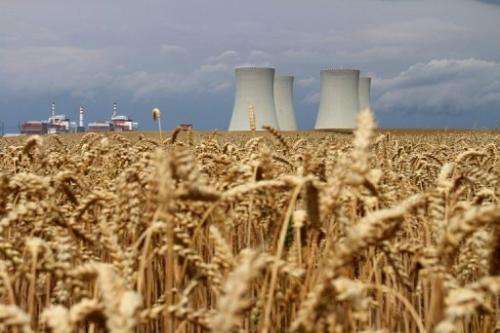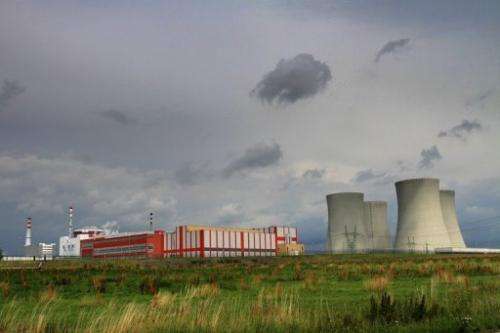Shale, coal price splits Czech government on nuclear project

A project costed in billions of euros to expand a Czech nuclear plant has been undermined by the effects on energy prices of the shale gas revolution in North America, and is splitting the government.
Several politicians are echoing experts who say that the tender process for the huge contract should be delayed or abandoned.
A fall in energy prices, driven largely by the huge expansion of shale gas in North America, has thrown the economics of the Temelin expansion project into controversy.
The International Energy Agency said this month that the shale-oil and gas revolution in North America is a shock for global energy markets.
The Temelin plant, built with technology from the time of the Soviet Union, is also problematic in neighbouring Austria where there are concerns over the safety of the facility.
The Czech state-run power group CEZ has opened the tender to build two new units at the Temelin plant, and this has lured American, Russian and French bidders.
The eventual contract would be worth an estimated 200 billion to 300 billion koruna (8-12 billion euros, $10-15 billion).
But the benefits of the two units due to come online in 2025 are questionable, experts say, pointing to a fall of the price of energy and particularly of coal, and of the price of carbon pollution permits.
These factors raise the economic benefits of other sources of energy.
"It would pay off to consider expanding energy sources cheaper than nuclear plants," David Marek, an analyst with Prague-based investment bank Patria Finance, told AFP.
"Temelin simply doesn't pay off with the current energy prices. The market is regulated through carbon permits, and if they are as cheap as they are, coal-fired plants are more profitable," he added.
In the tender, US industrial giant Westinghouse is up against the MIR-1200 consortium, made up of Russia's Atomstroiexport and Gidropress and the Czech Skoda JS. France's Areva was eliminated from the running in October but has appealed against the decision.

The winner is due to be announced in autumn, but the centre-right coalition government, which comes to the end of its four-year term in 2014, is torn over whether to continue.
"To sign something this huge, I'd have to be sure the investment is efficient," Finance Minister Miroslav Kalousek, vice-chairman of the junior coalition right-wing TOP 09 party, said recently.
"And I'm not sure about that at all," he said, adding the expansion plan was originally "calculated on the basis of much higher power prices than the current level."
Other sources available if needed, analyst says
Prime Minister Petr Necas, chairman of the right-wing Civic Democrats and a fierce advocate of expanding Temelin, said the Czech Republic could not do without nuclear energy.
Having dubbed the tender "the contract of the century," Necas insisted the move to expand Temelin was "a strategic decision" as the country's coal-fired plants are likely to be shut down by 2020 under European Union rules.
"There's a big difference between an accountant...and a statesman," Necas said last week in reaction to Kalousek's words.
Kalousek replied that "at a time when the guaranteed price is twice the market price, the statesman becomes a megalomaniac."
"Although the industry ministry refuses to confirm this officially, more and more experts advise politicians to consider putting the Temelin project off at least by a few years," writes the Respekt weekly.
Under the conditions of the tender, CEZ may decide to choose none of the bidders without sanctions.
Ales Michl, an analyst with the Prague branch of Austria's Raiffeisenbank, told the DNES broadsheet daily that "it will make sense for CEZ to put off the Temelin project."
"Gas prices in the United States have fallen by 55 percent since 2010 following the launch of shale gas exploitation. If Europe imports shale gas or finds deposits, gas and power prices will also drop," he added.
The rift between Necas and Kalousek reflects tensions between Necas's Civic Democrats party and TOP 09 a year before general elections which are likely to hand power to the leftist opposition Social Democrats.
Planned in the communist era and launched in 2000, Temelin with two Soviet-era 1,000-megawatt reactors has been repeatedly criticised by neighbour Austria because of concerns about safety.
Germany, another neighbour and the Czech Republic's key trading partner, has vowed to shut down its nuclear facilities as of 2022 in the wake of the Fukushima disaster.
But even this move will not justify the new units at Temelin, experts say.
"Germany has a number of conventional sources which are relatively unused today. If the supply of power becomes insufficient, there are still many other sources to satisfy demand," said Marek.
"Right now the developments in Germany don't seem to make nuclear sources elsewhere in Europe profitable," he added.
© 2013 AFP





















